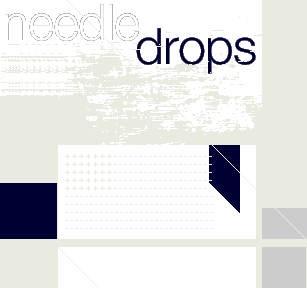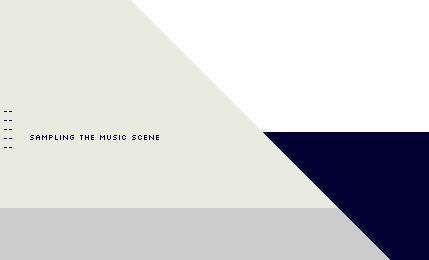


++ Contact Philip Sherburne ++
++ Recently ++
Tuesday, November 29, 2005 = The Stooges Unearthed (Again)
Tuesday, November 8, 2005 = Documenting Beulah And DCFC
Tuesday, November 1, 2005 = Out-Of-Control Rock 'N' Roll Is Alive And Well
Tuesday, October 25, 2005 = Just In Time For Halloween
Monday, October 3, 2005 = The Dandyesque Raunch Of Louis XI
Monday, August 15, 2005 = The Empire Blues
Tuesday, August 9, 2005 = David Howie's Sónar Diary
Monday, July 25, 2005 = Hot Sounds For Summertime
Monday, June 27, 2005 = Overcoming Writer's Block At Sónar 2005
Monday, June 4, 2005 = Cool New Sounds To Download Or Stream
++ Needle Drops Archives ++
View full list of Needle Drops articles...
|
|
 |
Friday, August 23, 2002
++ The Return of The 'The'
++ Is it just me, or are there a lot of bands cropping up with a
"The" in their name? The Hives, The Vines, The Strokes, The Please,
The Warlocks, The Shins. It must be a rock thing. After all, rock
— "the rock," if you want to be hipper than I am — has
returned with a vengeance, with bands like The Strokes and The White
Stripes charming the socks off everyone from Williamsburg hipsters to
the normally dance-music-prone English press.
Just look at the new issue of The Face: out of 40 "dressed-up,
messed-up, young, sexy, drunk and dirty new bands" (in other words,
the magazine's shotgun approach to pinpointing the Next Big Thing),
fully half of them have a "The" in their name. This template —
The [noun]s — took root with the British Invasion (there's a
band name perfectly suited for the times: The British Invasion!) and
has carried forward through punk, power pop, the garage rock revival,
and more. What's in a name? Perhaps nothing intrinsic — after
all, even the surliest rule-flouting rockers must accept the
essential arbitrariness of language (save, perhaps for the odd
onomatopoeic band name — does The Clash count?). Still, there's
something simple, stripped down, even spartan in the nomenclature of
these bands that seems appropriate for their back-to-basics sonic
approach. And while not everyone I've cited above sounds alike, it's
likely that they've all chosen their punchy, punky names at least in
part for their associative qualities — the connections they
spark in the vast, invisible database of pop music lore. Blame it on
The Beatles! If they'd called themselves, say,
Lennon/McCartney/Starr/Harrison, the ol' CSNY template might have
proven more popular — and the charts would look more like the
NASDAQ than a roster of sports teams.
The articular template actually splits into two camps, which we might
call The Plurals and The Concept. On the one hand, there's the
straightforward plural noun: The Strokes, The Doors, The White
Stripes (there seems to be no rule on capitalizing the article, by
the way). And then there are those bands that travel beneath a
grander banner: The Cure, The Rapture, The Who. The Concept template
is more malleable than that of The Plurals, in that it doesn't have
to make sense. Witness San Francisco's The Please, who hitch a verb
to their article and trundle off down the road toward rock 'n' roll
incongruity.
I've always been fascinated by the semiotics of band names. At their
most transparent, they reveal a band's desire to fit itself into a
pre-established slot. But I'm more intrigued by the way that band
names of particular genres coalesce around certain shapes and
patterns and themes, with the unerring accuracy and inscrutable logic
we can only chalk up to "culture." Digging into the soil of pop music
history reveals clusters and patterns as densely packed as the layers
of like-aged shells in geological strata.
Didn't you ever wonder why every crappy basement punk band used a
three-letter abbreviation? After the rise of D.R.I., J.F.A., D.O.A.,
and their ilk, it seemed that no suburban tract was without a band or
two of misfit kids banging away in their parents' garage beneath a
three-lettered banner. At least MDC had the sense to fuck with the
form, untethering their initials from the original name, Millions of
Dead Cops, and embracing alternate monikers like Millions of Dead
Children and Multi-Death Corporation. One punk band even got all meta
on the nomenclature question, taking the alias No Use for a Name.
The Brit-pop bands of the early '90s found their own groove, favoring
one-syllable words: Curve, Blur, Ride, Lush. (Many of these bands
even displayed grammatical parallelism, choosing words that do double
duty as nouns and verbs.) Brit-pop of a slightly later stripe
expanded syllabically but stuck to the one-word template: Oasis,
Travis, Coldplay. British bands of a more chemical inclination,
perhaps taking a page from the psychedelic rulebook of the Strawberry
Alarm Clock, opted for mismatched, mildly synaesthetic modifiers: the
Stone Roses, the Happy Mondays, Inspiral Carpets, Black Grape.
To the best of my knowledge, no one has ever assembled a detailed
taxonomy of pop music nomenclature. Such a project is undoubtedly
beyond the scope of this column, but I'd like to take this
opportunity to note some of my favorite conceits:
Alter Articles
These bands threw a major alphabetical wrench into the works when
they shunned the definite article in favor of the indefinite: how to
file a band like A Certain Ratio? Under "A"? Under "C"? (It's
possible that the longstanding battle between sallow, surly record
clerks and their customers was born of this conflict, a kind of
tomato/tomahto debate that eventually escalated to the proportions
detailed in High Fidelity.) Fortunately, these bands remained
few; after A Certain Ratio came industrialists A Split Second, and
then the indefinite article largely languished until A Minor Forest
took up the charge (with a nifty musical pun wreaking extra havoc on
the pronunciation).
A subset of the alter articles are the possessives: Her Space
Holiday, His Name Is Alive, His Hero Is Gone. Note that all these
examples tend to bear out the rule: the longer and/or more
grammatically convoluted the band name, the more likely the band is
to be self-consciously "experimental."
We've Got a Band Name and We're Going to Use It
OK, so perhaps that last formulation doesn't always hold up: We've
Got a Fuzzbox and We're Going to Use It were more cheeky than geeky.
Their 15 minutes as a band have long expired, but as a linguistic
phenomenon, they occupy one of my very favorite categories: the band
name as complete sentence. For whatever reason — very likely,
the self-conscious experimentalism postulate — this form has
thrived within emo and hardcore scenes. Most, but not all, of these
examples hail from there: My Dad Is Dead, No For An Answer, Curl Up
And Die, Sweep The Leg Johnny, Prevent Falls (if you take it as an
imperative, it's a sentence, all right), Cars Get Crushed, Give Until
Gone, Godspeed You Black Emperor!, and of course the inimitably
titled ...and you will know us by the trail of dead.
Before them all there were They Might Be Giants; in the world of
electronic music, Add N to (X).
Proper Names
Why exactly do the emo kids love wacky names so much? Where the early
emo names tended to gravitas — Embrace, Rites of Spring —
the third-generation bands have veered toward kitsch. Maybe it's
because so many of these bowl-cut boffins are so insecure in their
own skins, but there's a lot of playacting going on: hence bands like
Rainer Maria, Ezra Pound, Paul Newman, Joan of Arc, Bob Tilton, and
even The Baldwin Brothers — all named for real people who have
nothing to do with the bands.
A cheekier variant of the proper name alias tweaks the celebrity name
just enough to guarantee offending somebody: thus
Jackie-O-Motherfucker and one of my longstanding favorites, John
Cougar Concentration Camp.
All Mixed Up
With apologies to Ric Ocasek, who knew better than to encumber his
well-oiled machine with fancy linguistic spoilers, what else but the
phrase "All Mixed Up" captures the convoluted state of names like
these? The Rachel's — a classic rawk name, but for that damned
apostrophe. Literally, it must mean "The Of Rachel," which turns out
to be remarkably close to the name of another Chicago pretento-rock
outfit, The For Carnation. Yes, once again, it's the indies and the
emos that seem so drawn to the strangely distended lapses of grammar,
a syntax that could almost be described as Escherian. At The Drive-In
is awkward, but not so bad — still, what exactly is conveyed by
it? At the drive-in what? The Sea and Cake reportedly sprang
from a mispronunciation ("The C in Cake"), and brings a nice bit of
surrealism to the band's dreamy gusting. The all-time classic
mixed-up name: Gastr del Sol.
Slightly less adventuresome than the AMUs are the bands employing
Semiotic Clash, which takes the Strawberry Alarm Clock's penchant for
odd modifiers one step further, often with an incoherent grammatical
twist: Jimmy Eat World, Christie Front Drive.
Punctuation
Then there are the minimalists: those bands that look to the humble
punctuation mark as the sign of their differentiation. There's not
much to say about them except that they have caused endless grief for
editors and fact-checkers everywhere. In fact, they're almost
impossible to list in a sentence, as this example makes clear:
Frente!, that dog., Adult., and Mission: (who recently changed their
name to Crown City Rockers, under legal pressure from the Mission UK
— who themselves had to add the "UK" after a cease-and-desist
from the Philly R&B act the Mission). Other notables include ? and
the Mysterians and The Roots' ?uestlove. The extreme case here is
!!!, which is reportedly pronounced "chik chik chik," and runs so
thoroughly contrary to any attempts at alphabetization that most
record stores don't even file their CDs — they just use them to
prop up tippy tables.
++ The above, of course, is only a smattering of the patterns
spiraling through popular music like complex fractals. There are the
Double Doubles (Liquid Liquid, Duran Duran), the Alphanumerics (23
Skiddoo, June of 44, Blink 182, Kid606), the Deliberate Misspellings
(too many to list, from Led Zeppelin to Phish to Hawd Gankstuh Rappuh
Emsees Wid Ghatz — no, I'm not making that one up). There are
the straightedge bands given to compound words (Warzone, Slapshot),
and those given to prepositions (Chain of Strength, Youth of Today).
There are the hundreds of bands with "Youth" in their name. And of
course the thousands upon thousands of triple-initialed diehards.
But no conceit remains stronger than the The. Doubtless, its current
vogue will wane again; we may see a resurgence of the "Thee" mutation
(Thee Headcoats, Thee Hydrogen Terrors, Thee Slayer Hippy) or perhaps
a "Tha" or two (Tha Alkaholiks). Perhaps someone, inspired by the
recursive logic of The The, will throw a little stutter into the mix,
adopting a name like The The Strokes, say. And while there's no
predicting what the next great wave of band nomenclature will be, I'd
like to see someone use a haiku. Heck, if Fiona Apple could title an
album with a short essay, surely 17 syllables aren't too many for a
simple band name. Matty Karas has even offered an example to get the
trend started:
"we are a rock band
"this is what you should call us
"no, there is no 'the.'"
|
| |
|